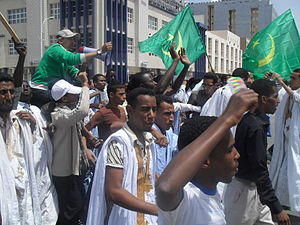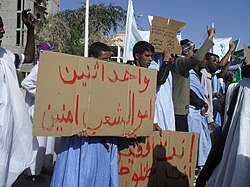2011–2012 Mauritanian protests
hideThis article has multiple issues. Please help or discuss these issues on the talk page. (Learn how and when to remove these template messages)
|
| 2011–2012 Mauritanian protests | |||
|---|---|---|---|
| Part of the Arab Spring | |||
 Mauritanian youth protesters in Nouakchott on 25 April 2011 | |||
| Date | 25 February 2011 – 2012 | ||
| Location | |||
| Goals |
| ||
| Methods |
| ||
| Parties to the civil conflict | |||
| Lead figures | |||
| |||
| Casualties | |||
| Death(s) | 3[7][8] | ||
| Injuries | 6 | ||
The 2011–2012 Mauritanian protests were a series of protests in Mauritania that started in January 2011, concurrent with the Arab Spring, and continued into 2012. The largely peaceful protest movement has demanded President Mohamed Ould Abdel Aziz institute political, economic, and legal reforms. Common themes of protest have included slavery, which is officially illegal in Mauritania, but is widespread in the country,[9] and other human rights abuses the opposition has accused the government of perpetrating.[10]
Timeline[]
Start of protests[]

Following the example of Mohamed Bouazizi, a Tunisian fruit vendor who set himself on fire the previous month to protest the government of Tunisia, a middle-aged businessman named Yacoub Ould Dahoud burned himself in front of the Presidential Palace in Nouakchott on 17 January 2011. He left behind a note explaining that injustice in Mauritania led him to commit suicide in this way.[11] Dahoud died on 23 January in hospital.[7] His self-immolation set off a round of protests in the capital starting on 20 January, when protesters gathered in Place 1 Mai to declare their intent to peacefully assemble as an act of civil disobedience until the government recognised their demands.[10]
Protests ramp up[]
The 25 February Movement took off on 25 February 2011 when protesters across Mauritania assembled a 28-point list of reforms they demanded the government institute.[10] The protest movement spread quickly outside the capital to cities like Aleg, Aoujeft, Atar, and Zouerate. The following month, protesters in many cities were met with a police crackdown.[12][13] On 25 April 2011, protesters again gathered to demand the resignation of Prime Minister Moulaye Ould Mohamed Laghdaf. These protests against the prime minister came despite some economic concessions by authorities, including a promise by Laghdaf to create at least 1,700 new jobs in food production, and an offer from the Interior Ministry to negotiate with an appointed representative of the youth movement.[2]
Protests against the census[]

Hundreds of black African Mauritanians marched starting in late September 2011 to decry the government census as "racist" due to a higher standard for blacks to prove Mauritanian citizenship than Arabs. On 27 September 2011, seven black protesters were shot by police in Maghama, near the international border with Senegal, and two of them died from their wounds.[8][14] Days later, 56 protesters were arrested in Noaukchott. Protesters gathered in Inal in the country's north, as well as in Noaukchott, on 28 November to again rally against the census. At least one was wounded and another was detained as security forces intervened to stop the protest in the capital city.[15]
Student protests[]
Students at the (ISERI) began protesting on 14 December 2011. Police responded with force, firing tear gas and frequently clashing with student groups. The unrest led to the closure of ISERI, but students continued to assemble. Several were detained on 16 January 2012, only to be released by police five days later in response to public anger. On 25 January, students organised a "Day of Anger" to protest ISERI's closure.[10]
Anniversary[]
To mark the one-year anniversary of Yacoub Ould Dahoud's self-immolation, protesters gathered in Noaukchott to denounce President Mohamed Ould Abdel Aziz and his government. Peaceful rally-goers held homemade signs and chanted slogans calling for reform. Several days later, on 28 January 2012, Qatar-based news network Al Jazeera ran a story on the Mauritanian protests, characterising them as "overlooked" due in part to the relative lack of Internet penetration in Mauritania. It is estimated only 2 percent of Mauritanian households have reliable Internet connections.[10]
Opposition protests[]
On 3 April, thousands of people in Mauritania have attended demonstrations in the capital calling for President Mohamed Ould Abdelaziz to resign. The opposition groups held peaceful "decentralised" rallies in the nine districts of Nouakchott. Organisers said they opposed "anti-democratic" policies of the government. They accused the president of rigging elections held in 2009 which confirmed him in power and refusing to hold a serious national dialogue with opposition groups.[16]
Protests flare up again on 19 July, when thousands of Mauritanians protested in the capital late Wednesday, calling for the departure of President Mohamed Ould Abdel Aziz, whom they accuse of despotism and mismanagement. Protestors chanted "Aziz get out" and "we are sick of the tyrant" as they marched through the capital.[17]
References[]
- ^ Who Shot A.A.? – By Alex Thurston. Foreign Policy (27 November 2012). Archived 28 July 2013 at the Wayback Machine
- ^ Jump up to: a b "Protests stun Mauritania". Al Arabiya. 25 April 2011. Archived from the original on 28 April 2011. Retrieved 25 April 2011.
- ^ Alakhbar | Université de Nouakchott: L’UNEM annonce 'un mercredi de colère'. Fr.alakhbar.info (20 April 2012).
- ^ Jump up to: a b Mauritania: Dreaming about the Fall of the Military State African Futures, September 2012, 2012.
- ^ Mauritania's opposition boycotts independence celebrations: News. Africareview.com (21 November 2012).
- ^ Mauritania Opposition Demands Election After President Is Shot. Businessweek (2 November 2012). Archived 28 July 2013 at the Wayback Machine
- ^ Jump up to: a b "Mauritania's Bouazizi died today". Dekhnstan.wordpress.com. 23 January 2011. Retrieved 28 October 2011.
- ^ Jump up to: a b Marouf, Oudaa (28 September 2011). "Two Killed in Mauritania's Anti-Census Protest, Group Says". Bloomberg. Retrieved 29 January 2012.
- ^ Corrigan, Terence (6 September 2007). "Mauritania: Country Made Slavery Illegal Last Month". The East African Standard. Archived from the original on 21 November 2010. Retrieved 21 January 2008.
- ^ Jump up to: a b c d e "Mauritania's Overlooked Uprising". Al Jazeera. 28 January 2012. Archived from the original on 31 January 2012. Retrieved 29 January 2012.
- ^ "Mauritanie: mécontent du régime, un homme s'immole par le feu à Nouakchott". Le Parisien (in French). France. 17 January 2011. Retrieved 26 January 2011.
- ^ "Mauritania protesters want better salaries, lower food prices". Radio Netherlands Worldwide. 12 March 2011. Archived from the original on 17 March 2011. Retrieved 23 March 2011.
- ^ "Mauritania police crush protest – doctors announce strike". Radio Netherlands Worldwide. 9 March 2011. Archived from the original on 5 December 2012. Retrieved 23 March 2011.
- ^ "One dead in Mauritania protest". Reuters. 27 September 2011. Archived from the original on 3 February 2016. Retrieved 29 January 2012.
- ^ "Mauritania race protest". News24. 29 November 2011. Retrieved 29 January 2012.
- ^ BBC News – Mauritanian protests against President Abdelaziz. Bbc.co.uk (3 April 2012).
- ^ Arab Spring knocks on door of Mauritanian President again:. Middle East Online (19 July 2012).
- 2011 in Mauritania
- 2012 in Mauritania
- Arab Spring by country
- 2011 protests
- 2012 protests